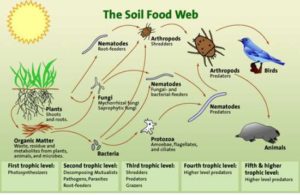Saturday, November 26th, 2016
Stephan: A number of years ago two close friends of mine, Peter Tompkins and Christopher Bird, wrote a book, The Secret Life of Plants, that became a huge bestseller and then a movie. In the course of their research they were introduced to the idea that the key to plant growth was the bacteria and fungi in the soil. This led to a second book, The Secrets of the Soil. In many ways the second was the more important book, although it didn't sell nearly as well. This idea of the microbial life of the soil as the key to successful agriculture, however, has stood the test of research and the facts now support the hypothesis. Here is the latest on this important subject. It is another negative proof, by the way, of the Theorem of Wellbeing.

Credit: Mother Earth News
A study of GMO cotton varieties shows they disrupt an important beneficial soil fungus, writes Eva Sirinathsinghji, apparently due to the Bt insecticide they are engineered to express. Disruption caused by the transgenic cotton to mycorrhizal fungi, and the wider soil ecosystem, may underlie the low yields and poor pest resistance now endemic among Bt GM crops.
This study is the latest warning that a decisive shift from industrial / GMO practices to sustainable, agroecological methods is needed to undo the damage, and ensure food security and health of people and planet for the future.
A new study finds that transgenic cotton genetically modified to express a Bt (Bacillus thuringiensis) insect toxin inhibits the development of the beneficial soil organism Rhizophagus irregularis, a common arbuscular mycorrhizal (AM) fungus.
The study, which examined three separate genetically modified (GM) cotton lines and three non-GM lines, also found that the GM varieties disrupt the ability of the fungus to form a symbiotic association with the GM crop.
The fungus, when grown […]












Most organic gardeners know this information already. As a matter of fact, I use leftover mushroom compost to fertilize my garden, since they replenish their mushroom soil every year, but it still contains a lot of great nitrogen in that soil which can be beneficial to a garden. Tomkins and bird are two of my favorite authors, by the way and their books are essential for those who want to know about growing anything organic.